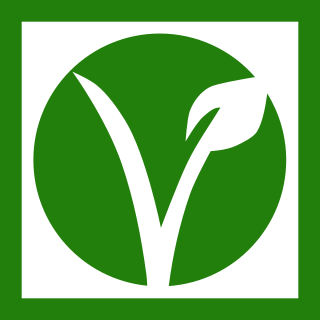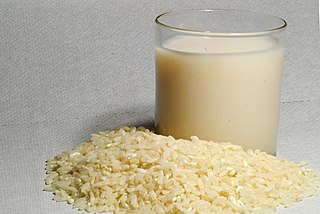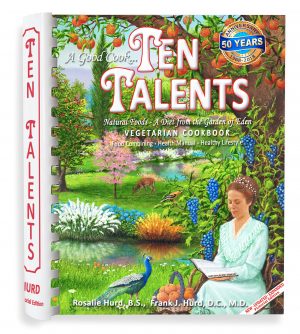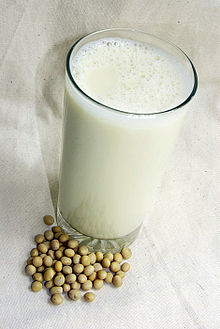
Veganism is the practice of abstaining from the use of animal products—particularly in diet—and an associated philosophy that rejects the commodity status of animals. A person who follows the diet or philosophy is known as a vegan.

Textured or texturized vegetable protein (TVP), also known as textured soy protein (TSP), soy meat, or soya chunks, is a defatted soy flour product, a by-product of extracting soybean oil. It is often used as a meat analogue or meat extender. It is quick to cook, with a protein content comparable to some meats.

A meat alternative or meat substitute, is a food product made from vegetarian or vegan ingredients, eaten as a replacement for meat. Meat alternatives typically approximate qualities of specific types of meat, such as mouthfeel, flavor, appearance, or chemical characteristics. Plant- and fungus-based substitutes are frequently made with soy, but may also be made from wheat gluten as in seitan, pea protein as in the Beyond Burger, or mycoprotein as in Quorn. Alternative protein foods can also be made by precision fermentation, where single cell organisms such as yeast produce specific proteins using a carbon source; as well as cultivated or laboratory grown, based on tissue engineering techniques.

Soy milk, also known as soya milk or soymilk, is a plant-based drink produced by soaking and grinding soybeans, boiling the mixture, and filtering out remaining particulates. It is a stable emulsion of oil, water, and protein. Its original form is an intermediate product of the manufacture of tofu. Originating in China, it became a common beverage in Europe and North America in the latter half of the 20th century, especially as production techniques were developed to give it a taste and consistency more closely resembling that of dairy milk. Soy milk may be used as a substitute for dairy milk by individuals who are vegan or lactose intolerant.

Amazake is a traditional sweet, low-alcohol or non-alcoholic Japanese drink made from fermented rice. Amazake dates from the Kofun period, and it is mentioned in the Nihon Shoki. It is part of the family of traditional Japanese foods made using the koji mold Aspergillus oryzae, which also includes miso, soy sauce, and sake.

Rice milk is a plant milk made from rice. Commercial rice milk is typically manufactured using brown rice and brown rice syrup, and may be sweetened using sugar or sugar substitutes, and flavored by common ingredients, such as vanilla. It is commonly fortified with protein and micronutrients, such as vitamin B12, calcium, iron, or vitamin D.

Okara, soy pulp, or tofu dregs is a pulp consisting of insoluble parts of the soybean that remain after pureed soybeans are filtered in the production of soy milk and tofu. It is generally white or yellowish in color. It is part of the traditional cuisines of Japan, Korea, and China. Since the 20th century, it has been used in the vegetarian cuisines of Western nations.

Soy protein is a protein that is isolated from soybean. It is made from soybean meal that has been dehulled and defatted. Dehulled and defatted soybeans are processed into three kinds of high protein commercial products: soy flour, concentrates, and isolates. Soy protein isolate has been used since 1959 in foods for its functional properties.

Alpro is a European company based in Ghent, Belgium, that markets organic and non-organic, non-genetically modified, plant-based products, such as foods and drinks made from soy, almonds, hazelnuts, cashew, rice, oats or coconut. Alpro employs over 1,200 people in Europe and has three production facilities in Belgium, France and the United Kingdom. Alpro markets its products in Europe and beyond with the majority of its business in Europe.

Tofu is a food prepared by coagulating soy milk and then pressing the resulting curds into solid white blocks of varying softness: silken, soft, firm, extra firm. Tofu is also known as bean curd in English. It is a traditional component of East Asian and Southeast Asian cuisines that has also been consumed in China for over 2,000 years. In modern Western cooking, it is most often treated as a meat substitute.

Wotou or wowotou, also called Chinese cornbread, is a type of steamed bread made from cornmeal in Northern China.

Vegan cheese is a category of non-dairy, plant-based cheese analogues. Vegan cheeses range from soft fresh cheeses to aged and cultured hard grateable cheeses like plant-based Parmesan. The defining characteristic of vegan cheese is the exclusion of all animal products.
La Loma Foods, formerly named Loma Linda Food Company and Loma Linda Foods, and with products presently branded under the name Loma Linda and Loma, is a former food manufacturing company that produced vegetarian and vegan foods. It is presently an active brand of vegetarian and vegan food products produced and purveyed by the Atlantic Natural Foods Company of Nashville, North Carolina. Loma Linda Foods began operations in 1905 under the name The Sanitarium Food Company and was owned by the Seventh-day Adventist Church until 1990.

Ten Talents is a vegetarian and vegan cookbook originally published in 1968 by Rosalie Hurd and Frank J. Hurd. At the time, it was one of the few resources for vegetarian and vegan cooks. The cookbook promotes Christian vegetarianism and a Bible-based diet, in keeping with teachings of the Seventh-day Adventist Church. By 1991, the 750-recipe cookbook was entering its 44th printing and had sold more than 250,000 copies. An expanded edition with more than 1,000 recipes was issued in 2012.

The Farm Vegetarian Cookbook is a vegan cookbook by Louise Hagler, first published in 1975. It was influential in introducing Americans to tofu, included recipes for making and using tempeh and other soy foods, and became a staple in vegetarian kitchens.

Harry Willis Miller was an American physician, thyroid surgeon and Seventh-day Adventist missionary. Miller was a vegetarian and pioneer in the development of soy milk.
William Roy Shurtleff also known as Bill Shurtleff is an American researcher and writer about soy foods. Shurtleff and his former wife Akiko Aoyagi have written and published consumer-oriented cookbooks, handbooks for small- and large-scale commercial production, histories, and bibliographies of various soy foods. These books introduced soy foods such as tofu, tempeh, and miso on a wide scale to non-Asian Westerners, and are largely responsible for the establishment of non-Asian soy food manufacturers in the West beginning in the late 1970s. In 1980, Lorna Sass wrote in The New York Times, "The two people most responsible for catapulting tofu from the wok into the frying pan are William Shurtleff and Akiko Aoyagi.” In 1995, Suzanne Hamlin wrote in The New York Times, “At the turn of the century there were two tofu suppliers in the United States. Today there are more than 200 tofu manufacturers...and tofu can be found in nearly every supermarket."

Alan Stoddard was a British osteopath and vegetarianism activist.

















